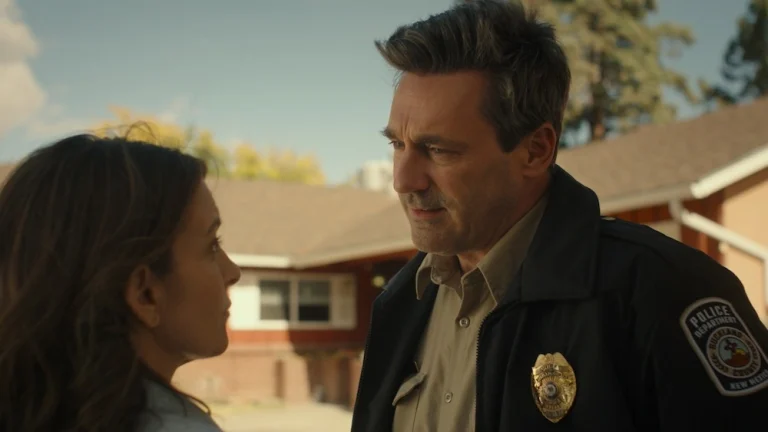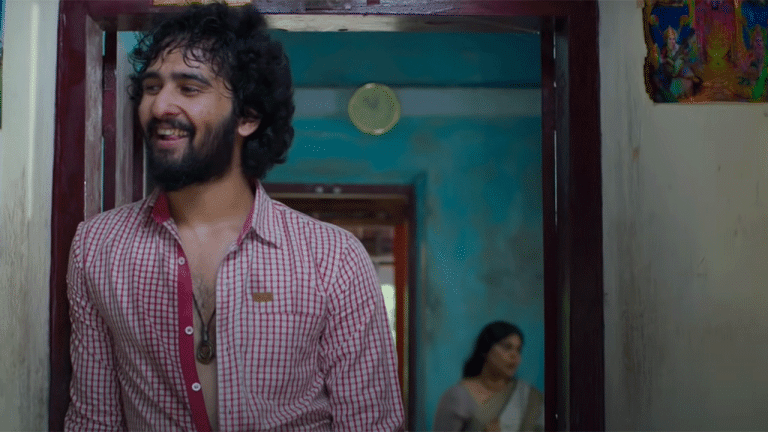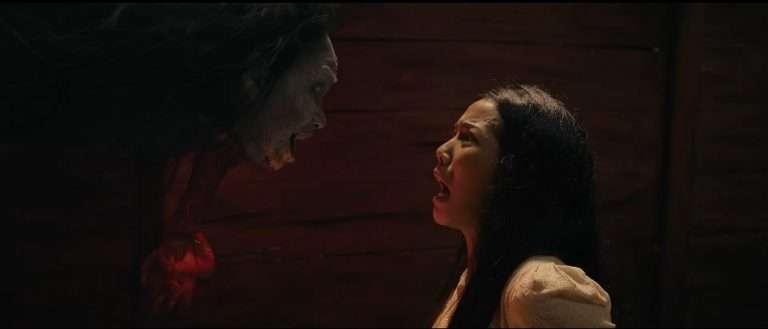Amat Escalante’s “Lost in the Night” (Original title: Perdidos en la noche) is driven towards an exploration of guilt, regret, and morality. It skewers the class divides rampant as they are in its setting of Mexico. Across the rural space, the markers of denomination, hierarchies of privilege, and exclusion are starkly evident. As the less-endowed strike out against injustice and exploitation, down comes a brutal hammer. It’s a morally murky quagmire Escalante depicts, hinting at a worldview refusing to trade in clear-cut binaries. The bad guys express remorse, and the good one who has the right on their side don’t always do morally favorable things.
Escalante surprises, especially since the thematic terrain of class conflicts is a well-trod one. So, he genuflects on the characterization, amping up unexpected discoveries and realizations shifting across a morally nebulous spectrum. No person is wholly avaricious, they have quite a few redeeming qualities. Evil isn’t maximized. Neither is the nobility of the seeking protagonist exaggerated. Each side has its own throbbing doubts and complexities, wavering and hesitant and deeply flawed.
Lost in the Night (Perdidos en la noche, 2024) Plot Summary & Movie Synopsis:
A Community Divided by Greed and Resistance
The screenplay, which Amat co-wrote with Martin Escalante, is also suggestive of bigger players, replete with a religious organization that has shady links. But the macro sense of the narrative flickers. It feels vaguer, lacking in texture and depth. To marshal a formidable sense of intricate politics undergirding the local and the community, the film needed a clearer shape of pivotal players. The film skips a lot when it comes to establishing connections, tending to be elusive. There are no big, flashy revelations in the narrative. One may or may not be guilty as apprehended. Things are more complicated than they seem. Choices unravel the big pathos of living.
The film opens at a protest site. It’s a rural town in Mexico. There is a massive overdrive by a big corporation and the government to set off mining endeavors that will dramatically erode the landscape and change the lives of the residents. Of course, the promise of compensation is a hollow one. The town is split between pro-mining and those firmly against it. A group of local activists is at the vanguard of resistance. In the first act itself, one of the protesting women gets kidnapped.
The film cuts to three years later. The woman’s son, Emiliano (Juan Daniel Garcia), is the protagonist for much of the film. The mother was the leader of the protestors. She was called Paloma. Her mystery frames the events of the film. Her son is obsessed with uncovering what happened to her. It has been a hapless quest, leading to dead ends. Moreover, the town is full of repressed secrets. Emiliano keeps looking around, hoping to detect significant clues. His elder sister takes a more official route. However, he is cynical of the system. He finds out from a cop that his mother’s disappearance is linked to the wealthy and influential Aldama family. He somehow lands a job at the family villa. The family has been at the receiving end of attacks by a religious organization, Alux messengers.

The actress and singer, Carmen, her artist husband, Rigo, and influencer daughter, Monica, become intricately woven with Emiliano. There is a push-pull of attraction between Emiliano and Monica, though the former has a girlfriend, Jazmin. A good relationship of trust is how Rigo sees Emiliano. This doesn’t remain the situation. Emiliano sneaks around in the middle of the night and tumbles across several corpses in a well on the estate. Trust is breached, and suspicion is aroused.
Lost in the Night (Perdidos en la noche, 2024) Movie Ending Explained:
Rigo confesses to Emiliano the family’s complicity and asks her if he would agree to an artistic interpretation of his life. This enrages Emiliano further. The mines’ owners have the Aldama family as one of the shareholders. In fact, they put into motion the ambush and killing of Paloma. The details aren’t divulged. Rigo is haunted by guilt. He wants to turn his trauma into art. On the return of the duo to the shore, Carmen confronts Rigo. She is furious at him for confessing, for attempting to mess with her carefully built fame. She insists Emiliano dismiss every shard of her husband’s confessions. Emiliano flees from the family, even as Monica still adamantly tails him. She is besotted with him, though he doesn’t respond to her overtures with the same passion and ardor.
Emiliano finally can’t help being drawn back to Monica. He has a falling out with his girlfriend. He needs comfort, warmth, and understanding, which Monica is more than eager to endow him with. The pair make out in a field but Monica also films their act. She connects every inch of her life to her social media presence, cultivating her follower base.
Meanwhile, Carmen, in a fit of exhaustion and frustration, shoots Rigo dead. She calls the cops and pins all the blame on Emiliano, painting him as the one who always had ulterior designs on the family right from his joining their villa as a handyman. Emiliano somehow escapes the cops chasing him, hiding in a river’s depths till they go away. Wounded, however, Emiliano goes to Monica’s house. She shelters him. She tells him her mother planned for his imprisonment just for a while and would arrange for his quick acquittal. He is not convinced of her proposition. Neither is she exactly believing in her mother.
In the climax, she coerces Carmen to confess to her wrongdoings, while she secretly records it. She threatens to jump off the edge and kill herself if her mother doesn’t own up to her culpability in the murder of Rigo. The confession does happen. Yet, an emotionally spent, vacillating Monica ultimately takes her life. The cops take Carmen into custody while they let off Emiliano. He goes to his girlfriend, hoping to get a second chance. The film ends with not so much hope as a sigh. The powerful are only temporarily inconvenienced. Sooner or later, Carmen will get away with her wrongdoings. The road to justice stays closed for people like Emiliano forever.








